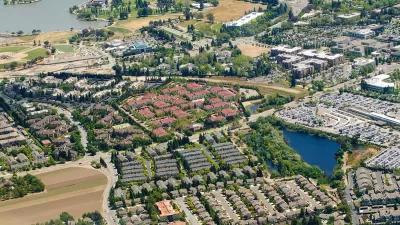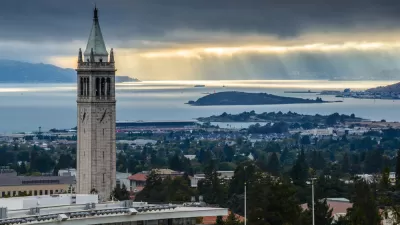A California initiative has been likened to the landmark Proposition 13 for how it would affect the budget and major projects proposed in California, including the $64 billion high-speed rail project and $17 billion Delta water tunnels.
A wealthy Stockton farmer, Dean Cortopassi, concerned about escalating state debt has underwritten what has been dubbed the 'No Blank Checks Initiative' (Proposition 53: Revenue Bonds) which would require all large capital projects financed with revenue bonds over $2 billion to receive voter approval. General obligation bonds are already placed on the ballot.
While Cortopassi's focus is state debt, which by any account is considerable, it's not clear that revenue bonds add to state debt.
"Unlike general obligation bonds, revenue bonds are not guaranteed directly by state or local government taxing powers," according to the state Legislative Analyst's Office write-up in August 2014 on the initiative. "Instead, revenue bonds are repaid using designated funding streams generally associated with the projects they finance."
"Although it has received less attention than many of the others, Cortopassi's measure could be the most significant in the long term and have a huge impact on the governor's legacy," reports Paul Rogers, environment and science journalist for The Mercury News.
While a $9.5 billion bond measure authorizing the high-speed rail project received voter approval in 2008, costs have risen. "Originally pegged at about $36 billion," it's now $64 billion, and completion time estimates have been extended as the project has faced numerous lawsuits. Congress is opposed to providing any additional funding, and the private sector has yet to invest in the line as it has in the Dallas to Houston line or Miami to Orlando line.
One option to fund the rest would be for the state to sell revenue bonds paid back with fares from riders.
Delta Water Tunnels
The other project Rogers points to is "a $17 billion plan to build two massive tunnels, each 40 feet high and 35 miles long, under the Sacramento-San Joaquin River Delta to make it easier to move water south to farms and cities. That would be paid for largely with revenue bonds, funded mostly by rate hikes and property tax increases on water customers."
Roger's paper, The Mercury News, editorialized last November that Cortopassi "is right that California voters should be able to vote on Gov. Jerry Brown's misguided, $17 billion twin-tunnel plan for the Sacramento-San Joaquin River Delta."
But instead of a straightforward ballot measure, he has concocted a nightmare of a law that appears to require statewide voter approval of all state revenue bond projects costing more than $2 billion. It's a classic badly drafted proposition with the potential for massive unintended consequences, none of them good.
A bill that would require a vote on the controversial tunnels in 2018, AB 1713, received committee approval in April, but has since stalled. Looking at the reasons for opposition to the bill gives fodder to Proposition 53 proponents.
"The specter of future votes on other big proposals loomed large in their arguments against AB 1713," wrote John Myers for the Los Angeles Times in April.
"This could be a bad precedent for a lot of other infrastructure projects that are out there," said Cesar Diaz, legislative director of the State Building and Construction Trades Council.
Resemblance to Proposition 13 (1978)
Proposition 53's restrictions on raising funds by selling revenue bonds have been likened to the changes rendered by Proposition 13.
While associated mainly with property tax reform, the landmark proposition also changed the threshold for passing tax increases by state and local governments, according to a California Tax Data factsheet [PDF]:
- Vote Requirement for State Taxes: Proposition 13 requires any measure enacted for the purpose of increasing state revenues to be approved by a two-thirds vote of each house of the legislature.
- Voter Approval for Local “Special” Taxes: Proposition 13 requires taxes raised by local governments for a designated or special purpose to be approved by two-thirds of the vote.
Proposition 53 is "setting up a major battle involving taxpayer groups on one side and labor unions and business organizations on the other -- the same interest groups that lined up against each other 38 years ago when Californians passed Proposition 13," writes Rogers.
It's like Proposition 13," said Jon Coupal, the [Howard Jarvis Taxpayers Association's] president. "If you are committing the financial resources of future generations, it should be put to a vote of the people."
As for the mounting state debt, the motivation for Cortopassi to spend $4.5 million to qualify the initiative, it is indeed considerable. Gov. Jerry Brown's administration estimates it "at $318 billion in health care, pension liabilities, bond debt and other obligations," writes Rogers.
Correspondent's note: Seventeen measures, numbered as propositions 51 to 67, have been qualified by Alex Padilla, the California Secretary of State, for the November ballot.
FULL STORY: California bullet train, Delta tunnels: Jerry Brown's pet projects face threat from ballot measure

Study: Maui’s Plan to Convert Vacation Rentals to Long-Term Housing Could Cause Nearly $1 Billion Economic Loss
The plan would reduce visitor accommodation by 25% resulting in 1,900 jobs lost.

Alabama: Trump Terminates Settlements for Black Communities Harmed By Raw Sewage
Trump deemed the landmark civil rights agreement “illegal DEI and environmental justice policy.”

Why Should We Subsidize Public Transportation?
Many public transit agencies face financial stress due to rising costs, declining fare revenue, and declining subsidies. Transit advocates must provide a strong business case for increasing public transit funding.

Paris Bike Boom Leads to Steep Drop in Air Pollution
The French city’s air quality has improved dramatically in the past 20 years, coinciding with a growth in cycling.

Why Housing Costs More to Build in California Than in Texas
Hard costs like labor and materials combined with ‘soft’ costs such as permitting make building in the San Francisco Bay Area almost three times as costly as in Texas cities.

San Diego County Sees a Rise in Urban Coyotes
San Diego County experiences a rise in urban coyotes, as sightings become prevalent throughout its urban neighbourhoods and surrounding areas.
Urban Design for Planners 1: Software Tools
This six-course series explores essential urban design concepts using open source software and equips planners with the tools they need to participate fully in the urban design process.
Planning for Universal Design
Learn the tools for implementing Universal Design in planning regulations.
Smith Gee Studio
Alamo Area Metropolitan Planning Organization
City of Santa Clarita
Institute for Housing and Urban Development Studies (IHS)
City of Grandview
Harvard GSD Executive Education
Toledo-Lucas County Plan Commissions
Salt Lake City
NYU Wagner Graduate School of Public Service





























